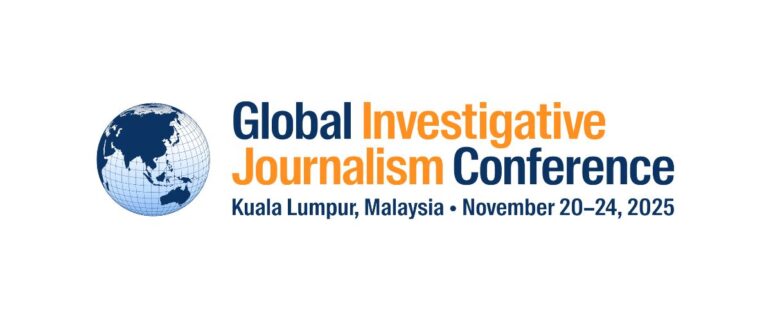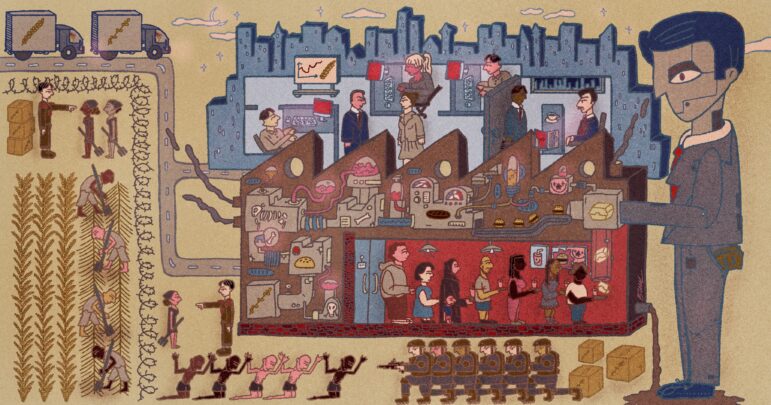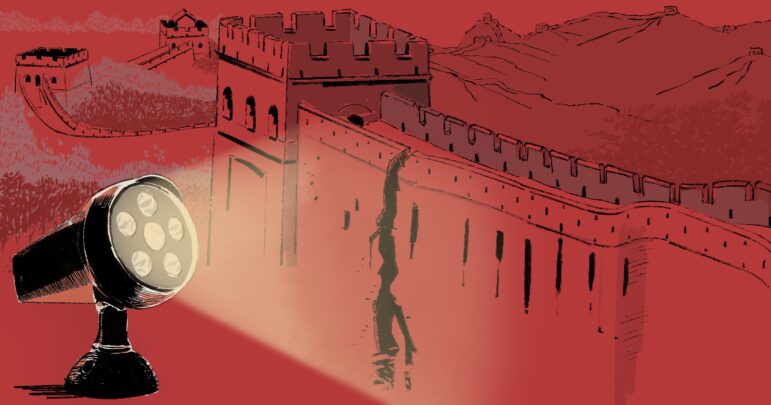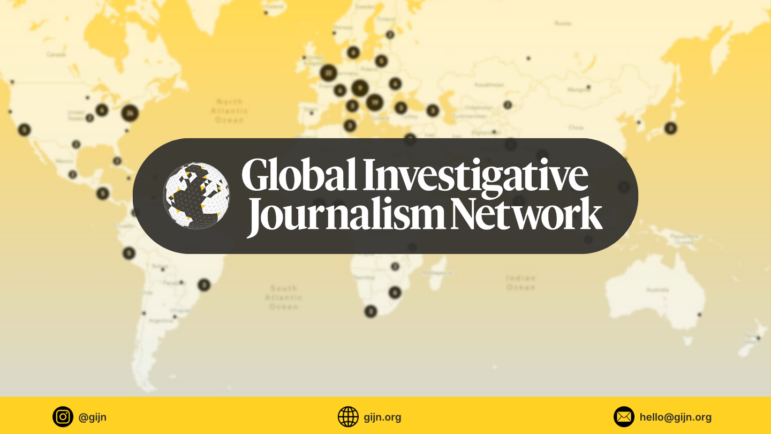

Image: GIJN
2025 Candidates for GIJN’s Board of Directors
This October, member representatives of GIJN will vote to elect seven members of the 15-person Board of Directors. Voting will take place between October 14 and 30, 2025.
Below is a list of candidates who have submitted their names for GIJN’s Board of Directors. GIJN members can vote for a maximum of four at-large Board members.

Regional members from Europe, Asia/Pacific, and sub-Saharan Africa are also eligible to choose one member to represent their respective regions. Ballots will be emailed to designated member representatives. If you are unsure who your representative is, contact us here.
For election background and rules, see our post on GIJN’s 2025 Board Election.
Candidates for Board of Directors
All candidates are listed below in alphabetical order.
Anton Harber (Sub-Saharan Africa)
George William Lugalambi (Sub-Saharan Africa)
Jeff Kelly Lowenstein (North America)
Kemi Busari (Sub-Saharan Africa)
Khadija Sharife (Sub-Saharan Africa)
Malek Khadhraoui (Middle East/North Africa)
Mercedes Bluske Moscoso (Latin America/Caribbean)
Motunrayo Alaka (Sub-Saharan Africa)
Wahyu Dhyatmika (Asia/Pacific)
Anton Harber (Sub-Saharan Africa)
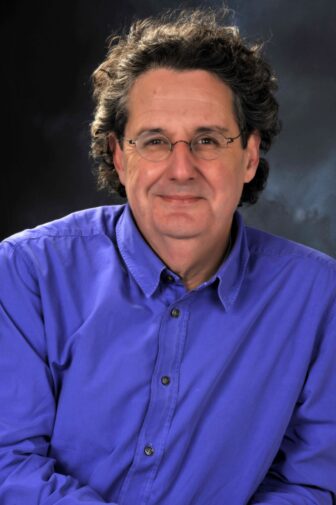 Anton Harber is executive director of the Henry Nxumalo Foundation, which supports investigative reporting in Southern Africa through grantmaking, mentoring and training, and a director of the Campaign for Free Expression. Harber was founder and editor of the anti-apartheid newspaper, The Weekly Mail/Mail & Guardian and editor-in-chief of the country’s leading TV news station, eNCA. He founded and ran the Taco Kuiper Award for Investigative Journalism and the African Investigative Journalism Conference for 19 years, and organized and hosted the GIJC in Johannesburg in 2017. Harber was for 20 years the Caxton Chair of Journalism at the University of the Witwatersrand as adjunct professor. He is a board member and former chair of Africa Check, the continent’s leading fact-checking agency, and vice-chair of the Centre for Collaborative Investigative Journalism (CCIJ). He has served as chair of the SA Conference of Editors and the National Association of Broadcasters. Harber is the author/editor of eight books. He has been a recipient of the Pringle Award for Press Freedom, the Missouri Medal of Honor, and the Recht Malan Award for Non-Fiction authors. In January 2024, Harber was named by New African Magazine as one of the Top 100 most influential people in Africa, and one of the top 12 in the media sector.
Anton Harber is executive director of the Henry Nxumalo Foundation, which supports investigative reporting in Southern Africa through grantmaking, mentoring and training, and a director of the Campaign for Free Expression. Harber was founder and editor of the anti-apartheid newspaper, The Weekly Mail/Mail & Guardian and editor-in-chief of the country’s leading TV news station, eNCA. He founded and ran the Taco Kuiper Award for Investigative Journalism and the African Investigative Journalism Conference for 19 years, and organized and hosted the GIJC in Johannesburg in 2017. Harber was for 20 years the Caxton Chair of Journalism at the University of the Witwatersrand as adjunct professor. He is a board member and former chair of Africa Check, the continent’s leading fact-checking agency, and vice-chair of the Centre for Collaborative Investigative Journalism (CCIJ). He has served as chair of the SA Conference of Editors and the National Association of Broadcasters. Harber is the author/editor of eight books. He has been a recipient of the Pringle Award for Press Freedom, the Missouri Medal of Honor, and the Recht Malan Award for Non-Fiction authors. In January 2024, Harber was named by New African Magazine as one of the Top 100 most influential people in Africa, and one of the top 12 in the media sector.
As a candidate seeking re-election to GIJN’s Board, Harber says:
When times are so challenging for journalists around the world, it is important that we stand together in a strong organization. I know from my own experience the value of international solidarity in sustaining journalism when we are under attack. GIJN has an important role to play in helping us defend ourselves and each other, but also — more positively — to facilitate the collaboration and build the networks which make for powerful journalism.
I have been involved in and served on the Board of GIJN for many years, including bringing the Global Conference to Africa for the first time in 2017. I founded and ran the African conference for 19 years. I have watched the progress we have made in raising the profile of African journalists at GIJC and know what further work we have to do to support our colleagues and strengthen our work on this continent.
I am also involved in exploring new models to enable quality journalism when newsrooms are under considerable financial constraint — and this is an important issue for our members.
GIJN has made me feel part of a vibrant global community, giving support and encouragement when we have needed it, as well as opportunities to offer such support and encouragement to friends across the world.
The shifting geo-politics of the world in which we operate is going to require us to judge when to be firm and strong, and when to be quick and nimble; how to take advantage of new technologies, while holding on to the values of good journalism. As a Board member, I hope to contribute to this kind of strategic thinking, based on how we have learnt to operate in my part of the world.
Geesje van Haren (Europe)
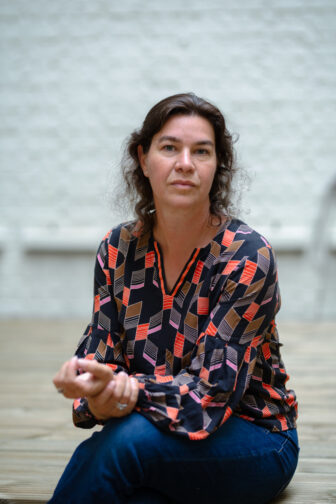 Geesje van Haren is a Dutch investigative journalist, media entrepreneur, educator, and founder whose work centers on telling underserved stories with depth and impact. She is co-founder of Lost in Europe, an award-winning cross-border investigative journalism collective focused on the disappearance and mistreatment of unaccompanied migrant children and other migration-related injustices through Europe. She also runs VersPers, her media organization and training platform, through which she supports journalists at all stages of their careers. Over more than 20 years, van Haren has built VersPers into a hub for serious journalism and creative skills development. At Lost in Europe, she leads a growing team of journalists, coordinating ground research, fundraising, storytelling, and fieldwork. In addition to her producing and coordinating roles, she is a teacher of investigative journalism, entrepreneurship, photography, and creative media practice. She founded Open Eyes Institute, a private school devoted to investigative journalism, which offers aspiring journalists intensive training and hands-on experience.
Geesje van Haren is a Dutch investigative journalist, media entrepreneur, educator, and founder whose work centers on telling underserved stories with depth and impact. She is co-founder of Lost in Europe, an award-winning cross-border investigative journalism collective focused on the disappearance and mistreatment of unaccompanied migrant children and other migration-related injustices through Europe. She also runs VersPers, her media organization and training platform, through which she supports journalists at all stages of their careers. Over more than 20 years, van Haren has built VersPers into a hub for serious journalism and creative skills development. At Lost in Europe, she leads a growing team of journalists, coordinating ground research, fundraising, storytelling, and fieldwork. In addition to her producing and coordinating roles, she is a teacher of investigative journalism, entrepreneurship, photography, and creative media practice. She founded Open Eyes Institute, a private school devoted to investigative journalism, which offers aspiring journalists intensive training and hands-on experience.
As a candidate seeking election to GIJN’s Board, van Haren says:
With a strong belief in GIJN’s mission and a professional track record to match, I believe I would be a valuable addition to the Board.
As co-founder of Lost in Europe, a cross-border investigative journalism project that exposes the disappearance of thousands of child migrants in Europe, I have seen the power and necessity of collaborative, investigative journalism that crosses borders, languages, and systems. GIJN has been instrumental in nurturing such collaborations, and I would be proud to contribute to its mission and growth.
I have spent the past decade developing and leading cross-border, collaborative investigations that combine traditional reporting with innovative techniques such as open-source intelligence (OSINT), data analysis, and visual storytelling. Through Lost in Europe and partnerships with major media outlets across Europe and beyond, I have built extensive experience in managing complex, multilingual investigations with high ethical and editorial standards.
I bring a strong commitment to collaboration, diversity, and innovation in the field of journalism. Over the years, I have consistently built initiatives that empower journalists to grow — whether they are young reporters taking their first steps, experienced journalists hitting a knowledge ceiling in their newsrooms, or experts transitioning into journalism to serve the public interest. I have always prioritized structures for shared learning and ensured that the insights gained during investigations are passed on — not just in stories, but in training, partnerships, and ongoing mentorship.
My motivation to join the Board stems from a deep commitment to amplifying underreported stories and supporting investigative journalism that serves the public interest — particularly in environments where press freedom is shrinking and vulnerable communities are at risk. With Lost in Europe, we’ve built a network of investigative journalists across Europe, working together on sensitive and complex stories involving migration, child protection, and systemic failures. This experience has given me strong insight into the challenges investigative reporters face — from security concerns and funding constraints to ethical dilemmas and the need for trauma-informed approaches.
I have been attending global conferences for years. In fact, Lost in Europe was born during the GIJN Global Conference in Johannesburg.
Joining the GIJN Board would be a natural extension of my commitment to empowering investigative journalists worldwide. I believe I can bring a valuable perspective, rooted in cross-border collaboration, a commitment to ethical investigative practices, and a drive to make journalism more inclusive and impactful. Joining the Board would allow me to contribute my experience, networks, and vision to help GIJN strengthen its role as a vital resource and community for investigative journalists around the world.
GIJN has an outstanding track record in supporting investigative journalism based on documents, leaks and databases. I aim to complement this strength by contributing a methodology rooted in oral history and long-term collaboration with unheard communities — especially those affected by migration, conflict, and structural inequality. By identifying patterns across lived experiences and integrating them into our investigations, we bring essential voices to the centre of our reporting.
George William Lugalambi (Sub-Saharan Africa)
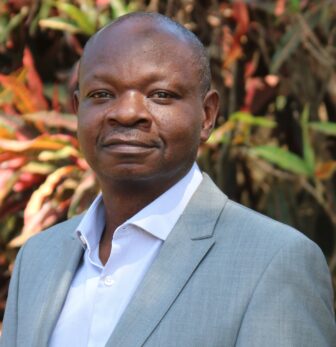 George William Lugalambi is the executive director of the African Centre for Media Excellence in Kampala, Uganda, a position he assumed in July 2022. He holds a doctorate in mass communication from Pennsylvania State University, USA, and oversees a diverse portfolio of media projects that support journalists and media in Uganda, Kenya, and Tanzania to strengthen their capabilities in accountability journalism and investigative reporting. From 2019 to 2023, he served as the Uganda national facilitator of the Africa regional International Training Programme on Media Development in a Democratic Framework, networking extensively with media leaders and policymakers in Uganda, Kenya, Zambia, Tanzania and Zimbabwe, and contributing to debates on advocacy strategies to democratise and improve the media ecosystems in these countries. After working as a newspaper reporter, columnist, and editor in his early career between 1990 and 1996, Lugalambi moved full-time into academia at Makerere University’s Department of Journalism and Communication, before switching careers to media development in 2011. For seven years he implemented programs to strengthen media oversight of the extractive industries of oil, gas, and mining. Working with the Natural Resource Governance Institute, he managed projects that benefitted around 500 journalists across Africa.
George William Lugalambi is the executive director of the African Centre for Media Excellence in Kampala, Uganda, a position he assumed in July 2022. He holds a doctorate in mass communication from Pennsylvania State University, USA, and oversees a diverse portfolio of media projects that support journalists and media in Uganda, Kenya, and Tanzania to strengthen their capabilities in accountability journalism and investigative reporting. From 2019 to 2023, he served as the Uganda national facilitator of the Africa regional International Training Programme on Media Development in a Democratic Framework, networking extensively with media leaders and policymakers in Uganda, Kenya, Zambia, Tanzania and Zimbabwe, and contributing to debates on advocacy strategies to democratise and improve the media ecosystems in these countries. After working as a newspaper reporter, columnist, and editor in his early career between 1990 and 1996, Lugalambi moved full-time into academia at Makerere University’s Department of Journalism and Communication, before switching careers to media development in 2011. For seven years he implemented programs to strengthen media oversight of the extractive industries of oil, gas, and mining. Working with the Natural Resource Governance Institute, he managed projects that benefitted around 500 journalists across Africa.
As a candidate seeking election to GIJN’s Board, Lugalambi says:
In Africa and around the world, the Global Investigative Journalism Network is, in my view, the organization best positioned to champion public interest journalism in ways that authentically embrace geographical diversity, accommodate differences in professional resource endowment, and celebrate the value that members in various parts of the world bring to the table.
The African Centre for Media Excellence, which I lead, is heavily invested in supporting working journalists to access the knowledge and resources they need to excel in their practice as specialised investigative journalists, and as journalists committed to holding power to account. As such, we actively draw upon the professional and intellectual resources available through GIJN platforms and learning channels to support the journalists and media organisations we serve.
Yet at the same time, GIJN is equally intentional in looking out for, amplifying, and disseminating our home-grown resources and knowledge products to make them accessible to journalists across Africa and beyond. It is this recognition of mutual value that I hope to build on to ensure that African and other under-resourced media systems play a constructive role.
I believe, going by my organization’s own experience, that African media organizations do possess, within their means, the capability to contribute ideas and knowledge to advance the practice of investigative reporting and public interest journalism in general. This tradition of journalism faces existential threats from digital technology, artificial intelligence, economic headwinds, and authoritarian tendencies even from places that only recently were considered sanctuaries for freedom of expression, critical journalism, and media rights.
I have witnessed GIJN walk the talk by going beyond advocacy, and actually providing practical tools and actionable strategies for journalists to do their work professionally, safely, and especially secure from modern-day technology-driven and politically-inspired occupational risks and threats. I will support GIJN to buttress its foothold on this path.
Jeff Kelly Lowenstein (North America)
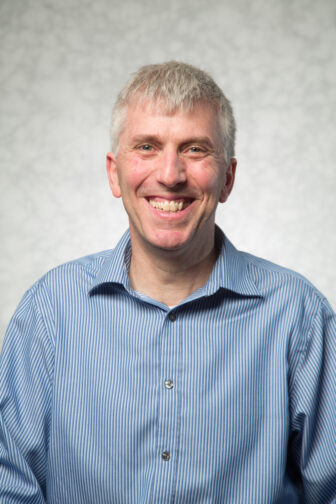 Jeff Kelly Lowenstein is the founder and executive director of the Center for Collaborative Investigative Journalism (CCIJ) and the former Padnos/Sarosik Endowed Chair of Civil Discourse at Grand Valley State University. His work has been published in The New Yorker, USA TODAY, and the Center for Public Integrity, among many publications, and has earned national and international recognition from organizations like Investigative Reporters and Editors (IRE), the National Press Club, the National Headliner Awards, and the Institute for Nonprofit News (INN). Lowenstein has served on the boards of the Dart Society, Chicago Headline Club, and Alibi Investigations, and participated in fellowships about racial justice, the environment, health, business and trauma. A five-time Fulbright Scholar, Specialist and Teacher, he has written or edited seven books.
Jeff Kelly Lowenstein is the founder and executive director of the Center for Collaborative Investigative Journalism (CCIJ) and the former Padnos/Sarosik Endowed Chair of Civil Discourse at Grand Valley State University. His work has been published in The New Yorker, USA TODAY, and the Center for Public Integrity, among many publications, and has earned national and international recognition from organizations like Investigative Reporters and Editors (IRE), the National Press Club, the National Headliner Awards, and the Institute for Nonprofit News (INN). Lowenstein has served on the boards of the Dart Society, Chicago Headline Club, and Alibi Investigations, and participated in fellowships about racial justice, the environment, health, business and trauma. A five-time Fulbright Scholar, Specialist and Teacher, he has written or edited seven books.
As a candidate seeking election to GIJN’s Board, Lowenstein says:
I’m asking for your vote to serve as an at-large member on GIJN’s Board to contribute to strengthening investigative journalism at a critical time for our community and planet. GIJN provides invaluable support to its members who are grappling with the interrelated challenges of mis/disinformation heightened by AI, decreased revenue and eroded trust. I’d be honored to join this group of people working on this vital mission.
I bring multiple attributes to my application. I am a longtime investigative journalist who has collaborated on impactful projects with colleagues around the world. As the founder and executive director of the Center for Collaborative Investigative Journalism (CCIJ), I understand how to assemble and generate resources for a global team to carry out high-quality investigative, training and safety work. A Spanish, French, German and Italian speaker, I’ve worked as an educator for close to four decades, including the last 12 years at the university level. I’ve also served effectively on the boards of journalism and other non-profit organizations.
If elected, I would focus on helping organizations gain greater sustainability through collaboration and amplifying the voices of journalists working and living in marginalized regions. Thank you for your consideration.
Kemi Busari (Sub-Saharan Africa)
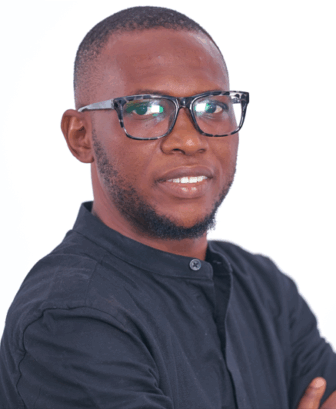 Kemi Busari is an award-winning journalist, academic researcher, teacher and mentor, who has held key roles across the media in Nigeria, the US, the UK, and others. He has contributed to several editorial projects in global organizations such as the United Nations Institute for Development and Planning (UNIDEP), the International Center for Journalists (ICFJ), the International Fact-Checking Network (IFCN), and Witness, USA. Known for leveraging his investigative reporting skills to drive social impact, Busari’s work has exposed corruption, influenced policy reforms, and led to arrests. At DUBAWA, the fact-checking initiative of the Centre for Journalism Innovation and Development (CJID), Busari leads a dynamic team of young fact-checkers who combat mis- and disinformation around elections, health, technology, and others. Over the past decade, Busari has played a pivotal role in nurturing the next generation of African reporters, training more than 3,000 journalists in areas such as investigative reporting, fact-checking, journalism ethics, and more. For his investigative reporting Busari has won some of the biggest national and international awards in journalism, including the Free Press Hans Verploeg Award, the ICFJ Award for Excellence in Africa Storytelling, the IFCN Highest Impact Fact-Check Award, and the Kavli Science Reporting Award by the American Association for the Advancement of Science.
Kemi Busari is an award-winning journalist, academic researcher, teacher and mentor, who has held key roles across the media in Nigeria, the US, the UK, and others. He has contributed to several editorial projects in global organizations such as the United Nations Institute for Development and Planning (UNIDEP), the International Center for Journalists (ICFJ), the International Fact-Checking Network (IFCN), and Witness, USA. Known for leveraging his investigative reporting skills to drive social impact, Busari’s work has exposed corruption, influenced policy reforms, and led to arrests. At DUBAWA, the fact-checking initiative of the Centre for Journalism Innovation and Development (CJID), Busari leads a dynamic team of young fact-checkers who combat mis- and disinformation around elections, health, technology, and others. Over the past decade, Busari has played a pivotal role in nurturing the next generation of African reporters, training more than 3,000 journalists in areas such as investigative reporting, fact-checking, journalism ethics, and more. For his investigative reporting Busari has won some of the biggest national and international awards in journalism, including the Free Press Hans Verploeg Award, the ICFJ Award for Excellence in Africa Storytelling, the IFCN Highest Impact Fact-Check Award, and the Kavli Science Reporting Award by the American Association for the Advancement of Science.
As a candidate seeking election to GIJN’s Board, Busari says:
I am honored to be nominated by the Centre for Journalism Innovation and Development (CJID) to serve on the Board of Directors of the Global Investigative Journalism Network. With over 14 years of experience in investigative journalism, I have consistently dedicated my career to public-interest reporting that promotes accountability, challenges injustice, and strengthens democratic values in West Africa.
Since joining CJID in 2020, I have led and contributed to critical work aimed at improving democratic governance across the region, particularly through the fight against misinformation during elections. As Editor of DUBAWA, I have overseen fact-checking and editorial strategy, covering more than 10 elections across West Africa. Through an annual fact-checking fellowship, I train and mentor the current crop of fact-checkers in the region. My work continues to bridge the gap between rigorous journalism and democratic development in Sub-Saharan Africa.
Throughout my career, I have produced investigations that have shaken institutions, informed policy changes, led to arrests of wrongdoers, and triggered national conversations. Several of these stories are now being used as case studies in journalism departments across Nigerian universities, extending their impact into the classroom and shaping the thinking of future journalists. For my work, I have received over two-dozen journalism awards and nominations, including some of the most prestigious national and international recognitions.
In addition to reporting, I am deeply engaged in training and mentoring the next generation of investigative journalists in the region. Through various initiatives championed by organizations like the United Nations Institute for Development and Planning, UNESCO, Google News Initiative, to mention but a few, I have helped nurture many emerging talents who are now contributing meaningfully to the field. My strong ties with journalists and newsrooms across West Africa will further support GIJN’s mission of collaboration and capacity-building.
I also contribute to the development of knowledge products that advance journalism practice globally. I recently co-authored an AI editorial tool guide, peer reviewed Witness’ Community Verification Handbook, and am currently conducting academic research focused on newsroom practices, disinformation, and professional standards in African journalism.
GIJN plays a critical role in supporting investigative journalists around the world. If elected to the Board, I will bring my regional expertise, editorial leadership, teaching and mentorship experience, and research insight to help further GIJN’s global mission and strengthen its presence in Africa.
Khadija Sharife (Sub-Saharan Africa)
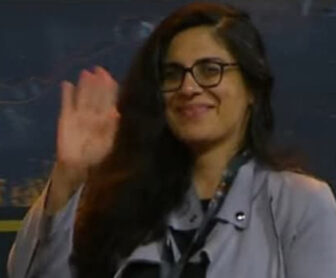 Khadija Sharife (LL.M.) is an investigative journalist and writer focused on behavioral finance, natural resources, and political economy. She previously served as a global journalist with the Organized Crime and Corruption Reporting Project (OCCRP) and is currently a board member of the Data and Research Center (DARC) and Oxpeckers Investigative Environmental Journalism. A Global Justice Fellow at Yale University, her reporting has exposed complex financial networks and abuses of power. She has helped to build and sustain a number of legal and journalistic initiatives providing investigative support to journalists. Most recently, she led an OCCRP investigation into a US-based medical company. Produced in collaboration with The Boston Globe, the project was a 2025 Pulitzer Prize finalist and received multiple awards.
Khadija Sharife (LL.M.) is an investigative journalist and writer focused on behavioral finance, natural resources, and political economy. She previously served as a global journalist with the Organized Crime and Corruption Reporting Project (OCCRP) and is currently a board member of the Data and Research Center (DARC) and Oxpeckers Investigative Environmental Journalism. A Global Justice Fellow at Yale University, her reporting has exposed complex financial networks and abuses of power. She has helped to build and sustain a number of legal and journalistic initiatives providing investigative support to journalists. Most recently, she led an OCCRP investigation into a US-based medical company. Produced in collaboration with The Boston Globe, the project was a 2025 Pulitzer Prize finalist and received multiple awards.
As a candidate seeking re-election to GIJN’s Board, Sharife says:
Being human is to bear witness — a moment that demands everything: consciousness, courage. To see and to hear when we’re told not to. To stand upright, even as the ground gives way. For journalists, that is also the job description.
Power prices life in dollars and cents, turning money into a weapon. The most vulnerable pay a tab that can never be repaid: societies are disposable, rivers unowned are expendable; the poor reduced to nobody’s nobody.
Unlike others in the trenches with us — nurses, activists, teachers — our duty lies in the public record. We know that truth, whispered once, can echo louder than a bomb. Even as nations are left to hunger and burn, with our kind on the frontlines, we recognize that the story is never just what is spoken, but also the resolve of those who dare enough to write it.
As darker becomes the new normal, our purpose is clear: What are we for, if not to bear witness?
The retreat of major donors has exposed philanthropy as a kind of trojan horse creating structural dependencies and a trickle down effect. Media caught between barefoot politics and bare cupboards are left without. Endangered. Hustling for survival.
My focus over the next two years is to help strengthen this fragile ecosystem — opening resources for remote fellowships and cross-border projects, and enabling freer access to the legal, data, and technical support needed to carry investigations from pitch to publication without ceding agency or control of our work.
I was fortunate enough to work with, and learn from, the best creators and caretakers. But I saw how the best among us often run a difficult and desperate race, not only for truth but against the inequities shaping their own lives — sometimes forced to choose between a story and their rent; public impact versus the safety of families.
It is the privilege of our lives to do this work. And if I am able to continue on, I will fight to make thing more just — and keep the faith.
Malek Khadhraoui (Middle East/North Africa)
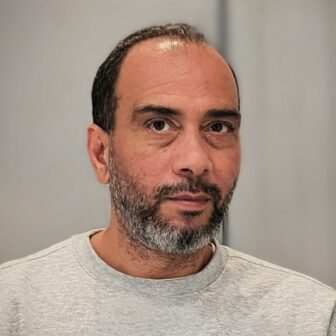 Malek Khadhraoui is a journalist, media entrepreneur, and press freedom advocate from Tunisia. He currently serves as Publishing Director of inkyfada.com, a leading independent investigative media outlet in Tunisia and the MENA region, and as Executive Director of Al Khatt, an NGO he founded to defend press freedom and promote quality journalism. His engagement dates back to the dictatorship of Ben Ali, when he co-led Nawaat, recipient of the RSF Press Freedom Prize in 2011. Since then, he has dedicated his career to building independent media and innovative journalism initiatives in challenging environments. He is also a member of the International Consortium of Investigative Journalists (ICIJ), a trainer in investigative and data journalism, and in sustainable media business models. In addition, Khadhraoui serves on the Board of Directors of Reporters Without Borders (RSF) and founded Inkylab, Inkyfada’s R&D lab, which develops editorial innovations and technological tools to support journalism’s future.
Malek Khadhraoui is a journalist, media entrepreneur, and press freedom advocate from Tunisia. He currently serves as Publishing Director of inkyfada.com, a leading independent investigative media outlet in Tunisia and the MENA region, and as Executive Director of Al Khatt, an NGO he founded to defend press freedom and promote quality journalism. His engagement dates back to the dictatorship of Ben Ali, when he co-led Nawaat, recipient of the RSF Press Freedom Prize in 2011. Since then, he has dedicated his career to building independent media and innovative journalism initiatives in challenging environments. He is also a member of the International Consortium of Investigative Journalists (ICIJ), a trainer in investigative and data journalism, and in sustainable media business models. In addition, Khadhraoui serves on the Board of Directors of Reporters Without Borders (RSF) and founded Inkylab, Inkyfada’s R&D lab, which develops editorial innovations and technological tools to support journalism’s future.
As a candidate seeking election to GIJN’s Board, Khadhraoui says:
My name is Malek Khadhraoui, and I am the Publishing Director of the independent Tunisian media outlet Inkyfada.com and the Executive Director of the NGO Al Khatt. For more than fifteen years, I have been committed to advancing press freedom, quality journalism, and innovation in investigative reporting across Tunisia, the MENA region, and the Mediterranean.
My engagement began under the dictatorship of Ben Ali, when I co-led the independent platform Nawaat, recipient of the RSF Press Freedom Prize in 2011. Since then, I have dedicated my career to building independent media that combine editorial integrity with sustainability and technological innovation. Through Al Khatt, I founded Inkyfada in 2014, which has since become a leading investigative media outlet in the region, known for bold cross-border investigations.
Inkyfada is an active member of GIJN, and I have seen firsthand the importance of this network in supporting investigative journalists worldwide. My work has also extended through membership in the International Consortium of Investigative Journalists (ICIJ), where I have participated in major global investigations, and as a trainer in investigative and data journalism as well as sustainable media business models, helping to strengthen capacities in Tunisia, the wider MENA region, and beyond.
A key component of my approach has been innovation: with Inkylab, Inkyfada’s R&D lab, we develop editorial and technological tools that enhance investigative storytelling and resilience for independent media. This dual editorial-technical experience allows me to bring both practical and strategic perspectives to GIJN.
I am running for an at-large Board seat because I want to contribute more directly to GIJN’s global mission. Having applied for the regional seat, I am even more motivated to bring forward my experience and help strengthen GIJN’s role worldwide. My ambition is to ensure that the voices of underrepresented regions, particularly North Africa and the Arab world, are more strongly heard within the network. I also want to share and promote sustainable models that can safeguard the independence of investigative journalism, and to foster cross-border collaboration, which I believe is essential in confronting today’s global challenges, from disinformation and corruption to the rise of authoritarianism.
I believe my personal and professional journey, as a journalist, activist, and media leader, resonates with GIJN’s mission. Serving on the Board would allow me to actively contribute to ensuring investigative journalism remains a global force for accountability and democracy.
Manka Heise (Europe)
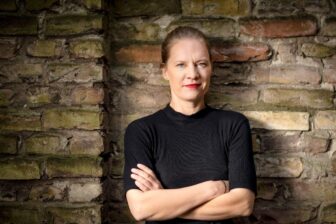 Manka Heise is the chief investigative reporter at Stern Investigativ, a role that she has held since 2022. There, she created and developed a cross-media platform where each topic features an hour-long documentary on RTL (prime time TV), a magazine title story and a serialized podcast. Producing an undercover investigation on working conditions in Elon Musk’s Berlin Tesla factory in 2023, she has also worked on documentaries and serialized podcasts on healthcare corruption and the right-wing politicization of the German educational system. Prior to this, Heise was an editor at Frontal 21 for ZDF (German public TV) for 10 years. There, she produced investigative, political, and social background reports. Various stories covered also had an impact on the political discussion or led directly to investigations. Heise graduated in religious studies and English and began her journalistic career with a traineeship at Spiegel TV/XXP. Her work has been recognized with a number of awards, including the German Journalism Award, Medium Magazin’s Journalist of the Year (Teams) in 2023 and 2024, as well as the Helmut Schmidt Journalist Prize.
Manka Heise is the chief investigative reporter at Stern Investigativ, a role that she has held since 2022. There, she created and developed a cross-media platform where each topic features an hour-long documentary on RTL (prime time TV), a magazine title story and a serialized podcast. Producing an undercover investigation on working conditions in Elon Musk’s Berlin Tesla factory in 2023, she has also worked on documentaries and serialized podcasts on healthcare corruption and the right-wing politicization of the German educational system. Prior to this, Heise was an editor at Frontal 21 for ZDF (German public TV) for 10 years. There, she produced investigative, political, and social background reports. Various stories covered also had an impact on the political discussion or led directly to investigations. Heise graduated in religious studies and English and began her journalistic career with a traineeship at Spiegel TV/XXP. Her work has been recognized with a number of awards, including the German Journalism Award, Medium Magazin’s Journalist of the Year (Teams) in 2023 and 2024, as well as the Helmut Schmidt Journalist Prize.
As a candidate seeking election to GIJN’s Board, Heise says:
We live in times when democracy faces unprecedented challenges. Populist movements and authoritarian regimes are increasingly targeting independent journalism. In this climate, investigative journalism is required more than ever: to expose the abuse of power, to give voice to the voiceless, and to hold the powerful accountable.
While Europe has long been considered relatively safe for journalists, we are now seeing investigative reporters across the continent facing growing pressure, legal threats, and coordinated attacks. As an investigative journalist still actively working in the field here in Europe, I experience these challenges directly. I know what it means to be targeted for doing our essential work. But I strongly believe in the power of investigative journalism.
These experiences have taught me that we cannot work in isolation — our strength lies in our unity. I believe that only if we connect, support, and empower each other through regular exchange of information and knowledge we are able to do this job.
My commitment to joining the GIJN Board stems from this understanding. I want to use my experience to support others in our community. Having worked internationally across multiple continents, l’ve seen how collaboration amplifies our impact and protects our work.
If elected, I will focus on two key goals:
- Strengthening worldwide solidarity: Building robust support networks for journalists facing legal pressure, ensuring that investigative reporters worldwide can continue their work without isolation.
- Knowledge exchange programs: Creating platforms for sharing best practices, security protocols, and investigative techniques specifically and to coordinate global investigations.
Endorsed by Netzwerk Recherche, I am ready to contribute my experience and energy to GIJN’s mission. I believe that we must stand together — not only as journalists, but as defenders of democratic values worldwide.
Margo Smit (Europe)
 Margo Smit is ombuds for journalistic content at the Dutch public broadcasting system, since 2017. From 2015, she was news ombuds at NOS, the Dutch public news provider. Previously, Smit was an independent investigative TV-documentary filmmaker and director of the Dutch-Flemish Association of Investigative Journalists VVOJ (2009-2015). Smit is president of the Organization of News Ombuds (ONO), and the current vice-chair of the Global Investigative Journalism Network’s Board. She is a guest lecturer on investigative journalism and ethics at national and international journalism schools and universities. Smit studied journalism in the United States, and in 1989 she began working as a news and features reporter for Dutch commercial TV station RTL, and later as their political correspondent. In 1997, she transferred to KRO Reporter, an investigative television documentary series on Dutch public TV, where she worked until 2009. Smit investigated the Dutch monarchy, nuclear safety and proliferation, accounting transparency at multinationals, Islam, honor killings, and the banking industry. She was co-producer of a KRO Profiel documentary on controversial politician Ayaan Hirsi Ali, nominated for the Prix Europa in 2005. Smit is a (sleeping) member of the International Consortium of Investigative Journalists (ICIJ) and covered their #LuxLeaks investigation on tax evasion for Dutch public TV in 2014. She was on the jury of the UNESCO/Guillermo Cano World Press Freedom prize (2022-2024), and has also acted as a juror for the Daniel Pearl Award, the M.J. Brusseprijs for non-fiction in the Dutch language, the DIG Awards for investigative documentaries (Italy), and the Global Shining Light Award.
Margo Smit is ombuds for journalistic content at the Dutch public broadcasting system, since 2017. From 2015, she was news ombuds at NOS, the Dutch public news provider. Previously, Smit was an independent investigative TV-documentary filmmaker and director of the Dutch-Flemish Association of Investigative Journalists VVOJ (2009-2015). Smit is president of the Organization of News Ombuds (ONO), and the current vice-chair of the Global Investigative Journalism Network’s Board. She is a guest lecturer on investigative journalism and ethics at national and international journalism schools and universities. Smit studied journalism in the United States, and in 1989 she began working as a news and features reporter for Dutch commercial TV station RTL, and later as their political correspondent. In 1997, she transferred to KRO Reporter, an investigative television documentary series on Dutch public TV, where she worked until 2009. Smit investigated the Dutch monarchy, nuclear safety and proliferation, accounting transparency at multinationals, Islam, honor killings, and the banking industry. She was co-producer of a KRO Profiel documentary on controversial politician Ayaan Hirsi Ali, nominated for the Prix Europa in 2005. Smit is a (sleeping) member of the International Consortium of Investigative Journalists (ICIJ) and covered their #LuxLeaks investigation on tax evasion for Dutch public TV in 2014. She was on the jury of the UNESCO/Guillermo Cano World Press Freedom prize (2022-2024), and has also acted as a juror for the Daniel Pearl Award, the M.J. Brusseprijs for non-fiction in the Dutch language, the DIG Awards for investigative documentaries (Italy), and the Global Shining Light Award.
As a candidate seeking re-election to GIJN’s Board, Smit says:
When Brant Houston and Nils Mulvad in 2001 first organized a conference that promoted international collaboration on investigative journalism and with that started the movement we now call the Global Investigative Journalism Network, they may not have envisioned the hundreds of reporters they inspired over the years. I am one of them — my professional life would have been bleaker and much less impactful without all I learned through GIJN.
I decided early on I wanted to give something back; I got involved in co-organizing global conferences (since 2005 in Amsterdam) and as a Board member for many years now stood by the dedicated staff that runs GIJN. The movement still inspires me, and I want to run one more time for a seat on the Board.
In times when almost everything seems to change in journalism worldwide, GIJN is a stable partner for many journalism organizations across the globe. It recently has successfully gone through a leadership transition. My institutional memory, diplomatic approach and extensive knowledge of the journalism ecosystem has added value in these turbulent times.
The years ahead are crucial for global democracy, and qualitative investigative journalism plays a pivotal role in safeguarding it. Journalism needs to be as strong as we can make it. International collaboration is indispensable. The Dutch-Flemish Organization of Investigative Journalists VVOJ endorses my candidacy, and with my presence on the Board wants to continue to be a pillar under the movement. We hope to get your support.
Mercedes Bluske Moscoso (Latin America/Caribbean)
 Mercedes Bluske Moscoso, born in Bolivia, is an award-winning investigative journalist with extensive experience in reporting corruption, the environment, and organized crime. She works for some of the leading journalistic initiatives in Latin America, such as CONNECTAS, where she serves as security compliance officer, providing support and security training to journalists from more than 10 countries. Her work focuses on ensuring that high-risk investigations can be conducted safely by following strict security protocols aimed to address physical, psychological, digital, legal, and reputational threats. In Bolivia, she co-founded the digital investigative media outlet Verdad con Tinta, which has been recognized with some of the country’s most prestigious journalism awards, such as the Eduardo Abaroa Award and the Hugo Ernst Rivera Award, among others. Bluske Moscoso has also contributed to La Hora de Venezuela, an unprecedented collaborative effort of 14 independent media outlets — 13 in Venezuela and CONNECTAS as the articulating organization — that bypassed the blockade imposed by the regime and safeguarded the right to information of millions in the country. She was in charge of establishing security protocols for the electoral coverage in Venezuela and supported subsequent publications by members of the project. Additionally, she has worked as a writer on regional reports assessing the state of investigative journalism in Latin America and the Caribbean, which has given her extensive knowledge of the context and challenges faced by journalists in the region.
Mercedes Bluske Moscoso, born in Bolivia, is an award-winning investigative journalist with extensive experience in reporting corruption, the environment, and organized crime. She works for some of the leading journalistic initiatives in Latin America, such as CONNECTAS, where she serves as security compliance officer, providing support and security training to journalists from more than 10 countries. Her work focuses on ensuring that high-risk investigations can be conducted safely by following strict security protocols aimed to address physical, psychological, digital, legal, and reputational threats. In Bolivia, she co-founded the digital investigative media outlet Verdad con Tinta, which has been recognized with some of the country’s most prestigious journalism awards, such as the Eduardo Abaroa Award and the Hugo Ernst Rivera Award, among others. Bluske Moscoso has also contributed to La Hora de Venezuela, an unprecedented collaborative effort of 14 independent media outlets — 13 in Venezuela and CONNECTAS as the articulating organization — that bypassed the blockade imposed by the regime and safeguarded the right to information of millions in the country. She was in charge of establishing security protocols for the electoral coverage in Venezuela and supported subsequent publications by members of the project. Additionally, she has worked as a writer on regional reports assessing the state of investigative journalism in Latin America and the Caribbean, which has given her extensive knowledge of the context and challenges faced by journalists in the region.
As a candidate seeking election to GIJN’s Board, Bluske Moscoso says:
Latin America is a critical region where autocracies and the shrinking of civic space have become a threat not only to democracy in the region, but also to the exercise of free and independent journalism.
Amid this complex regional landscape, CONNECTAS has been working on impactful stories that seek to convey its reality. In my case, working as a security compliance officer at CONNECTAS has allowed me to manage security strategies for reporting with journalists from more than 10 countries. This has enabled me to witness how the polarizing rhetoric in the region translates into attacks on journalists’ personal lives and reputations, in addition to the physical, legal, and emotional threats they face as a result of their work — making journalism a high-risk profession.
As a member of CONNECTAS — a network that brings together more than 165 journalists from Latin America — and as the founder of a small independent media outlet in my native Bolivia, I consider it of great importance that the region has a voice within the global work led by the Global Investigative Journalism Network (GIJN). This ensures that the region’s needs are reflected in GIJN’s programs and policies.
I have participated in the Global Investigative Journalism Conference (GIJC) in the past, as well as in programs offered by the network — such as Digital Threats — and I have witnessed its relevance in both the global and regional journalistic ecosystem. In my experience, the initiatives held by the Network not only provide access to high-end tools and experts in different areas, but also give access to a strong global network.
That is why I am submitting my candidacy for an at-large position on GIJN’s Board of Directors. My commitment is to contribute to the design of solid and regionally relevant policies for the region, aimed at addressing the challenges of the region and generating solutions to strengthen journalists’ work in a context marked by polarization and weakening of democracies. This includes promoting safer environments for investigative reporting, expanding opportunities and support for independent media, and connecting local realities with the organization’s global agenda.
Security challenges for journalists are common globally, and my experience working with physical, digital, legal, psychological, and reputational risks in the region has given me not only a greater understanding of the challenges, but also better tools to address them.
Also, the weakening of democracies is a phenomenon that is spreading across different regions of the world, so our Latin American experience can bring knowledge to the table about how journalism in the region is seeking to be part of the change.
I am confident that my experience and knowledge can enrich the work of the GIJN Board and contribute to the organization’s mission: to provide tools, support, and guidance to investigative journalists worldwide, ensuring that their work continues to shine a light on what those in power seek to keep in the dark.
Motunrayo Alaka (Sub-Saharan Africa)
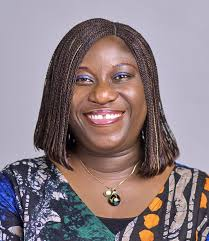 Motunrayo Alaka is the executive director and CEO of the Wole Soyinka Centre for Investigative Journalism (WSCIJ), a leading African nonprofit advancing accountability journalism and good governance. With nearly two decades of leadership, she has trained and mentored thousands of journalists, sustained Nigeria’s foremost investigative reporting award for 20 years, and led initiatives promoting equity, civic space, collaboration, and media sustainability. She serves on boards including the Centre for Collaborative Investigative Journalism (CCIJ) and Baraza Media Lab, and has provided thought leadership for global networks such as International Press Institute (IPI), African Investigative Journalism Conference (AIJC), the Brazilian Association of Investigative Journalism (ABRAJI), the Konrad Adenauer Stiftung (KAS), and Mathrubhumi International Festival of Letters, India. A two-time Stanford Fellow (Draper Hills and John S. Knight – JSK), Alaka champions ethical leadership, inclusive storytelling, and sustainable journalism as pillars of democracy and social justice.
Motunrayo Alaka is the executive director and CEO of the Wole Soyinka Centre for Investigative Journalism (WSCIJ), a leading African nonprofit advancing accountability journalism and good governance. With nearly two decades of leadership, she has trained and mentored thousands of journalists, sustained Nigeria’s foremost investigative reporting award for 20 years, and led initiatives promoting equity, civic space, collaboration, and media sustainability. She serves on boards including the Centre for Collaborative Investigative Journalism (CCIJ) and Baraza Media Lab, and has provided thought leadership for global networks such as International Press Institute (IPI), African Investigative Journalism Conference (AIJC), the Brazilian Association of Investigative Journalism (ABRAJI), the Konrad Adenauer Stiftung (KAS), and Mathrubhumi International Festival of Letters, India. A two-time Stanford Fellow (Draper Hills and John S. Knight – JSK), Alaka champions ethical leadership, inclusive storytelling, and sustainable journalism as pillars of democracy and social justice.
As a candidate seeking election to GIJN’s Board, Alaka says:
Globally, journalism faces perhaps its most challenging era yet. Misinformation, censorship, declining trust, shrinking resources, and political repression are on the rise, worsened by rapid digital disruptions. When we add the growing use of SLAPPs and increasing threats to civic space and democracy, it becomes clear that truth itself is in a constant battle against forces determined to silence it.
I am running for the Global Investigative Journalism Network (GIJN) Board because I believe deeply that strong journalism builds strong democracies. I want to help strengthen the global ecosystem for investigative and accountability journalism with improved ethics, representation, collaboration, and sustainability, especially across Africa and the Global South.
For two decades, I have worked at the intersection of journalism, democracy, and development, leading the Wole Soyinka Centre for Investigative Journalism (WSCIJ), a GIJN member organisation. Through this work, my team and I have supported over 10,000 journalists and 200 newsrooms and media support organisations with training, grants, and mentorship. We have advanced investigative reporting, strengthened press freedom, supported civic space, and nurtured newsroom leadership.
I have seen first-hand how collaboration and innovation can transform journalism locally, regionally, and globally. I have served as coordinator of the MacArthur Foundation’s Media and Journalism Cohort, and on boards including the Media Development Investment Fund’s NAMIP Advisory Council, the Centre for Collaborative Investigative Journalism (CCIJ), and Baraza Media Lab (Kenya). I have also provided thought leadership for the International Press Institute (IPI), the African Investigative Journalism Conference (AIJC), the Brazilian Association of Investigative Journalism (ABRAJI), Mathrubhumi International Festival of Letters, India, and the Konrad Adenauer Stiftung (KAS) Foundation, among others.
If elected, I will bring intentional, grounded, and empathetic leadership and nuanced perspectives from the Global South to advance GIJN’s strategy, growth, and sustainability. The strength of democracy depends on the strength of journalism, and I am committed to securing both.
Nina Selbo Torset (Europe)
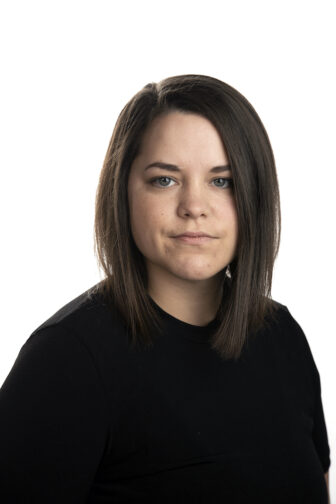 Nina Selbo Torset is the chair of the Norwegian Foundation for Investigative Journalism (SKUP), which was one of the founders of the Global Investigative Journalism Conference in 2003. She has served on the Board of GIJN since 2023. Torset has spent almost a decade engaging in data-driven and investigative journalism at Aftenposten, one of Norway’s premier news publications, where she currently serves as deputy news editor. Her investigative work includes exposés on the misuse of government funds and benefits, which led to the resignation of multiple lawmakers and top officials. Torset has earned several awards for her reporting, notably the SKUP Award, the most prestigious accolade for investigative journalism in Norway. Through her membership in the International Consortium of Investigative Journalists (ICIJ), international collaboration and cross-border investigations have become cornerstones in Torset’s investigative career. Since joining ICIJ in 2016, she has been involved in multiple projects, notably the Panama Papers, Paradise Papers, and Pandora Papers.
Nina Selbo Torset is the chair of the Norwegian Foundation for Investigative Journalism (SKUP), which was one of the founders of the Global Investigative Journalism Conference in 2003. She has served on the Board of GIJN since 2023. Torset has spent almost a decade engaging in data-driven and investigative journalism at Aftenposten, one of Norway’s premier news publications, where she currently serves as deputy news editor. Her investigative work includes exposés on the misuse of government funds and benefits, which led to the resignation of multiple lawmakers and top officials. Torset has earned several awards for her reporting, notably the SKUP Award, the most prestigious accolade for investigative journalism in Norway. Through her membership in the International Consortium of Investigative Journalists (ICIJ), international collaboration and cross-border investigations have become cornerstones in Torset’s investigative career. Since joining ICIJ in 2016, she has been involved in multiple projects, notably the Panama Papers, Paradise Papers, and Pandora Papers.
As a candidate seeking re-election to GIJN’s Board, Torset says:
It has been an honor to serve on the GIJN Board since 2023. During this period, I have seen first-hand the vital role GIJN plays in connecting investigative journalists across borders, sharing knowledge, and defending our craft at a time when it faces growing challenges.
I am seeking re-election because I want to continue contributing to this work. As chairwoman of SKUP, the Norwegian Foundation for Investigative Journalism, I represent an organization that has been a part of GIJN’s history since its early days. This background gives me both a long-term perspective on GIJN’s role and a strong commitment to its future.
My experience as an investigative journalist and member of ICIJ has taught me the power of collaboration, and I believe GIJN is uniquely positioned to strengthen investigative journalism worldwide. As a Board member, I aim to support GIJN’s efforts to expand its reach, build stronger regional networks, and ensure that our members have the tools and resources they need to hold power to account.
I look forward to the opportunity to keep working with colleagues across the globe to strengthen our profession and our collective impact.
Oleg Khomenok (Europe)
Oleg Khomenok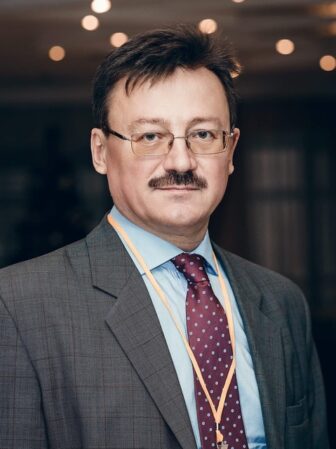 chairs the board of the Regional Press Development Institute, is an expert at the International Fact-Checking Network, and a member of the Commission on Journalistic Ethics of Ukraine. He has over 30 years of experience in investigative journalism, training, and managing investigative reporting projects across Eastern Europe and Eurasia, and eight years’ experience working as a reporter investigating political campaigns and ethnic minority issues in Crimea. Khomenok also co-founded and managed the SCOOP project in Ukraine, Belarus, and Russia from 2003 to 2018, and co-founded two Ukrainian members of GIJN: the Crimean Center for Investigative Reporting, and the Regional Press Development Institute. For the last 17 years, he has played a key role in organizing the annual Ukrainian Investigative Journalism Conference, a major regional event that brings together reporters from Western media alongside colleagues from Eastern Europe, Caucasus, Central Asia, and MENA. Over the past two decades he has conducted more than 100 training sessions on investigative journalism techniques and strategies for investigative reporters in Ukraine, Russia, Belarus, Moldova, the Caucasus, and Central Asia, and authored several investigative journalism textbooks and manuals.
chairs the board of the Regional Press Development Institute, is an expert at the International Fact-Checking Network, and a member of the Commission on Journalistic Ethics of Ukraine. He has over 30 years of experience in investigative journalism, training, and managing investigative reporting projects across Eastern Europe and Eurasia, and eight years’ experience working as a reporter investigating political campaigns and ethnic minority issues in Crimea. Khomenok also co-founded and managed the SCOOP project in Ukraine, Belarus, and Russia from 2003 to 2018, and co-founded two Ukrainian members of GIJN: the Crimean Center for Investigative Reporting, and the Regional Press Development Institute. For the last 17 years, he has played a key role in organizing the annual Ukrainian Investigative Journalism Conference, a major regional event that brings together reporters from Western media alongside colleagues from Eastern Europe, Caucasus, Central Asia, and MENA. Over the past two decades he has conducted more than 100 training sessions on investigative journalism techniques and strategies for investigative reporters in Ukraine, Russia, Belarus, Moldova, the Caucasus, and Central Asia, and authored several investigative journalism textbooks and manuals.
As a candidate seeking re-election to GIJN’s Board, Khomenok says:
I am running for the GIJN Board out of a strong commitment to strengthening and expanding investigative journalism networks and collaboration across post-Soviet countries, and to further engage reporters from this region in the global investigative community. Since GIJN’s founding, 28 nonprofit investigative media outlets from Ukraine, Armenia, Georgia, Latvia, Lithuania, Moldova, as well as exiled media from Azerbaijan, Belarus, Russia, Kyrgyzstan, and Turkmenistan, have joined the network, helping to establish and uphold high professional standards of investigative reporting in these countries.
In recent years, new global challenges have affected investigative journalism everywhere: the surge of foreign information manipulations and interference, violence, and SLAPP cases against journalists, shrinking international funding for investigative media, and the ongoing Russian aggression against Ukraine. At a time of such threats to press freedom and efforts to undermine investigative reporting, it is crucial to build stronger cooperation among professionals who speak different languages but share common standards, best practices, and a commitment to support colleagues working in hostile environments.
GIJN, as a truly global network, must remain proactive in shaping strategies that help investigative reporters across all continents meet these challenges. This means reducing risks, raising professional skills, fostering collaboration, and ensuring that investigations achieve tangible impact.
As a Board member, I see my priorities as:
- Uniting the efforts of the global investigative community to respond to local and regional challenges, and vice versa;
- Securing the ability of journalists to work professionally in hostile environments;
- Expanding GIJN’s membership in Eastern Europe and Eurasia by engaging new and emerging investigative media;
- Strengthening cross-border and regional collaboration through joint investigations into environmental issues, corruption, abuse, and crime;
- Supporting the development of a multilingual Resource Center and promoting the wider use of GIJN’s learning tools for reporters in Eastern Europe and Eurasia;
- Helping to diversify the sources of support for GIJN’s global and regional initiatives in this part of the world.
Özge Mumcu Aybars (Europe)
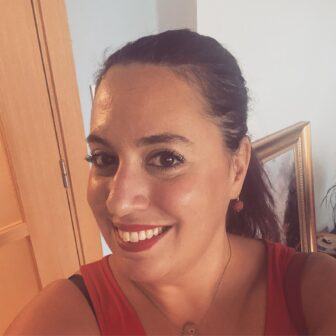 Özge Mumcu Aybars co-founded the Uğur Mumcu Investigative Journalism Foundation (um:ag) in 1994, established in memory of her father, one of Turkey’s most prominent investigative journalists. She holds a B.A. in Political Science from Bilkent University, an M.A. in Political Science from Ankara University, and a Ph.D. in Political Discourse from Middle East Technical University (METU). During her doctoral studies, she was an Erasmus Fellow at Pantheon University in Athens, and in 2016 she was selected as a Fellow of the European Union Visitors Program (EUVP). In 2024, Aybars was an alumni of the Turkey – Europe Future Forum. In 2025, she completed the Swedish Leadership Lab. Her professional career began as a political advisor with the Democratic Left Party. She later worked with TEPAV on Turkey-EU relations, peace processes, and constitutional reform. From 2017 to 2022, she served as a foreign relations consultant for the Republican People’s Party (CHP) under Ambassador Ünal Çeviköz, and she currently advises Ankara Metropolitan Mayor Mansur Yavaş on foreign relations. Aybars has led um:ag’s programs training more than 300 investigative journalism graduates, at least half actively working in the field. She coordinated numerous projects funded by the EU, Swedish Consulate, MATRA, FES, and the Olof Palme Center, including an EU-funded initiative in 10 cities with 170 local journalists. Since 2023 May, she has been working as a consultant at Journalismfund.eu. She also writes and hosts podcasts for Kisadalga.net.
Özge Mumcu Aybars co-founded the Uğur Mumcu Investigative Journalism Foundation (um:ag) in 1994, established in memory of her father, one of Turkey’s most prominent investigative journalists. She holds a B.A. in Political Science from Bilkent University, an M.A. in Political Science from Ankara University, and a Ph.D. in Political Discourse from Middle East Technical University (METU). During her doctoral studies, she was an Erasmus Fellow at Pantheon University in Athens, and in 2016 she was selected as a Fellow of the European Union Visitors Program (EUVP). In 2024, Aybars was an alumni of the Turkey – Europe Future Forum. In 2025, she completed the Swedish Leadership Lab. Her professional career began as a political advisor with the Democratic Left Party. She later worked with TEPAV on Turkey-EU relations, peace processes, and constitutional reform. From 2017 to 2022, she served as a foreign relations consultant for the Republican People’s Party (CHP) under Ambassador Ünal Çeviköz, and she currently advises Ankara Metropolitan Mayor Mansur Yavaş on foreign relations. Aybars has led um:ag’s programs training more than 300 investigative journalism graduates, at least half actively working in the field. She coordinated numerous projects funded by the EU, Swedish Consulate, MATRA, FES, and the Olof Palme Center, including an EU-funded initiative in 10 cities with 170 local journalists. Since 2023 May, she has been working as a consultant at Journalismfund.eu. She also writes and hosts podcasts for Kisadalga.net.
As a candidate seeking election to GIJN’s Board, Aybars says:
Investigative journalism in Turkey has long stood as a beacon of resilience and courage, even under immense political pressure and in the face of profound economic challenges. At um:ag, founded in memory of Uğur Mumcu, one of Turkey’s most prominent investigative journalists, we have spent more than 30 years training, inspiring, and connecting generations of reporters. To date, more than 300 journalists have graduated from our investigative journalism programs, with at least half actively working in the field today.
Alongside our training and publishing efforts, I have also conducted several international projects — supported by partners such as the Swedish Consulate, Matra, and Friedrich Ebert Stiftung (FES) — to reach local journalists across Turkey. Under careful editorial supervision, hundreds of the articles they produced are now featured on www.gazetecilerplatformu.com, which operates under the Foundation as an independent news website open to publish investigative reporting. Additionally, I led a major EU-funded project across 10 cities with the participation of around 170 local journalists, providing both training and practical opportunities to publish their work and amplify their voices.
I believe it is crucial that Turkey be seen not only as a challenging environment for journalism, but also as a fruitful country for investigative work. With a vibrant community of independent journalists and the growing commitment of younger generations, Turkey offers fertile ground for advancing GIJN’s mission and strengthening its global network. If elected, I aim to bring the perspective of a region where press freedom is contested but where investigative journalism continues to thrive; to strengthen collaborative journalism across borders by building stronger connections between Turkish journalists and their international peers; to share experiences from um:ag’s long-standing programs and projects that have nurtured investigative work under difficult circumstances; and to provide insights into Turkey’s evolving media landscape, helping GIJN better understand both its challenges and opportunities.
I am deeply committed to GIJN’s values of independence, collaboration, and innovation in investigative journalism. It would be a privilege to serve on the Board and to contribute to GIJN’s ongoing work to strengthen the global investigative community.
Sam Schramski (North America)
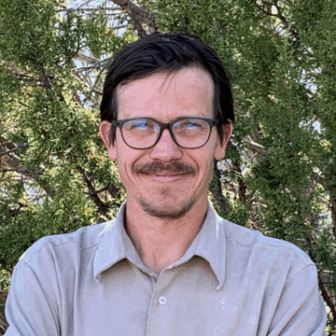 Sam Schramski is a journalist, editor, and researcher with over 15 years of experience in investigations. Currently serving as special projects editor at Earth Journalism Network, he coordinates cross-border investigative projects and develops online learning resources for journalists worldwide. With a doctorate in interdisciplinary ecology and extensive field experience across four continents, Sam brings a unique blend of academic rigor and journalistic acumen to his work. His expertise spans climate change, biodiversity, and sustainable development, and he has led workshops on investigative techniques in various countries. Schramski’s work has been recognized with awards from the Society of Publishers in Asia and the Pulitzer Rainforest Journalism Fund among others.
Sam Schramski is a journalist, editor, and researcher with over 15 years of experience in investigations. Currently serving as special projects editor at Earth Journalism Network, he coordinates cross-border investigative projects and develops online learning resources for journalists worldwide. With a doctorate in interdisciplinary ecology and extensive field experience across four continents, Sam brings a unique blend of academic rigor and journalistic acumen to his work. His expertise spans climate change, biodiversity, and sustainable development, and he has led workshops on investigative techniques in various countries. Schramski’s work has been recognized with awards from the Society of Publishers in Asia and the Pulitzer Rainforest Journalism Fund among others.
As a candidate seeking election to GIJN’s Board, Schramski says:
I am honored to submit my candidacy for an at-large position on GIJN’s Board of Directors. While I recognize the significant responsibility this role entails, I believe my experience as a journalist, educator, and researcher, combined with my deep respect for investigative journalism’s vital mission, positions me to contribute meaningfully to GIJN’s continued growth and impact.
My journey in media has taken me from newsrooms to research institutions, from Latin America to Africa and Asia, always with the conviction that rigorous, collaborative investigative reporting can drive meaningful change. As special projects editor at Earth Journalism Network, I have had the privilege of working alongside journalists from dozens of countries, coordinating cross-border investigations and witnessing firsthand both the challenges our profession faces and the extraordinary dedication of journalists worldwide.
My academic background has taught me to approach complex issues with scientific rigor while remaining accessible to broader audiences — a perspective I believe could complement GIJN’s mission of making investigative journalism both more impactful and more collaborative.
Should I be selected for this position, I hope to bring several areas of focus to my Board service:
Bridging communities: My experience working at the intersection of journalism and science has shown me the immense value of fostering dialogue between journalists, researchers, and civil society. I would work to strengthen these connections within GIJN’s network.
Expanding educational resources: Drawing from my work developing training materials and leading workshops on investigative techniques, I hope to help enhance GIJN’s learning platforms with input from the broader journalism community about what resources would be most valuable.
Supporting environmental journalism: While respecting GIJN’s broad mandate, I would advocate for increased support for environmental investigative reporting, recognizing both its urgency and the unique challenges journalists face when covering complex environmental issues.
Promoting safety and collaboration: Having worked with journalists in challenging environments, I understand the importance of both physical safety measures and the emotional support that comes from professional networks and cross-border collaboration.
Fostering inclusivity: My international experience has reinforced my belief that the strongest investigative journalism emerges when diverse voices and perspectives are centered in our work.
Effective Board governance requires listening as much as leading. I am committed to learning from my fellow Board members and the broader GIJN community, understanding that the organization’s strength lies in its collaborative spirit and collective expertise.
In the interest of transparency, I should note my current affiliation with Internews through Earth Journalism Network. Should any conflicts arise related to organizational interests, I would recuse myself from relevant discussions and decisions as appropriate.
Investigative journalism faces unprecedented challenges today, but I have seen its power to expose injustice, hold power accountable, and create positive change. I would be honored to contribute to GIJN’s mission of strengthening this vital profession, always with the understanding that the real heroes of this work are the journalists in the field pursuing truth under often difficult circumstances.
Thank you for considering my candidacy. I look forward to the opportunity to serve this remarkable community of journalists and to help advance investigative journalism’s essential role in our democratic societies.
Stephen Grey (Europe)
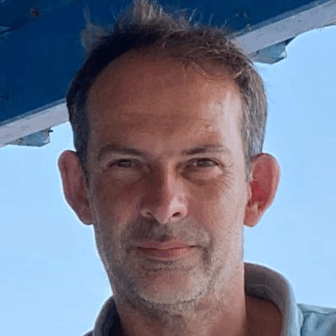 Stephen Grey is an award-winning reporter whose career spans more than three decades. Until January 2025, he spent 13 years working as a special correspondent at Reuters; prior to that, he worked as foreign correspondent and head of investigations (Insight Team editor) for the Sunday Times of London. Grey has written or broadcast for the BBC, The New York Times, the Guardian, Le Monde Diplomatique, Channel 4 Dispatches and Channel 4 News, PBS Frontline, and ABC News, and he is also the author of three books. A member of the International Consortium of Investigative Journalists (ICIJ), in 1999 he founded a collaboration that resulted in the resignation of the entire European Union commission, and he also co-founded the Daphne Project, which continued the work of murdered Maltese journalist Daphne Caruana Galizia. Grey hosted a USA number one podcast — Who Killed Daphne? — about the investigation, which identified the alleged mastermind (currently awaiting trial). He is known for his exclusive revelation exposing the CIA’s “torture airline” used for its program of extra-ordinary rendition, for front line investigations in the war zones of Iraq and Afghanistan, investigations into people smuggling in the Mediterranean, and exposés of corruption in Greece, Russia, Ukraine, and the UK. He left Reuters this year to co-found a forthcoming venture to fund investigative journalism globally.
Stephen Grey is an award-winning reporter whose career spans more than three decades. Until January 2025, he spent 13 years working as a special correspondent at Reuters; prior to that, he worked as foreign correspondent and head of investigations (Insight Team editor) for the Sunday Times of London. Grey has written or broadcast for the BBC, The New York Times, the Guardian, Le Monde Diplomatique, Channel 4 Dispatches and Channel 4 News, PBS Frontline, and ABC News, and he is also the author of three books. A member of the International Consortium of Investigative Journalists (ICIJ), in 1999 he founded a collaboration that resulted in the resignation of the entire European Union commission, and he also co-founded the Daphne Project, which continued the work of murdered Maltese journalist Daphne Caruana Galizia. Grey hosted a USA number one podcast — Who Killed Daphne? — about the investigation, which identified the alleged mastermind (currently awaiting trial). He is known for his exclusive revelation exposing the CIA’s “torture airline” used for its program of extra-ordinary rendition, for front line investigations in the war zones of Iraq and Afghanistan, investigations into people smuggling in the Mediterranean, and exposés of corruption in Greece, Russia, Ukraine, and the UK. He left Reuters this year to co-found a forthcoming venture to fund investigative journalism globally.
As a candidate seeking election to GIJN’s Board, Grey says:
I am proud to be nominated to this role by the Daphne Caruana Galizia Foundation, with whom I am an adviser to the board, and its courageous director Matthew. I am also honored to be applying to this position with the support of the Centre for Investigative Journalism in London. I have spent my career collaborating with teams of journalists across the world, particularly in war zones and other hostile environments. Having attended several fabulous global conferences, I want to do my part to promote the best possible innovative tools and techniques and the networks needed to expose powerful interests and destroy disinformation. I will do my utmost to prioritize and support and nurture the bravest and most vulnerable journalist talents who pay the price getting the information the world needs – but are often shabbily rewarded and lack the chance to get the training and resources they deserve.
Wahyu Dhyatmika (Asia/Pacific)
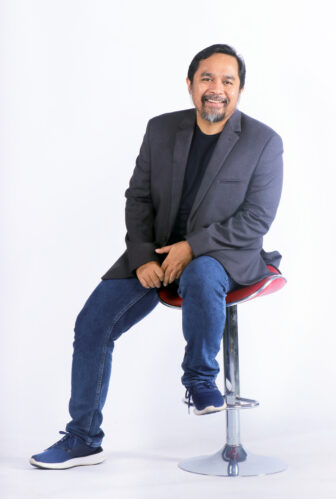 Wahyu Dhyatmika is the chairperson of Indonesian Cyber Media Association (AMSI) and CEO of Tempo Digital. Previously, he served as editor-in-chief for Tempo Weekly News Magazine in 2019-2021. AMSI has more than 500 online media members across Indonesia. Dhyatmika believes in journalism as a public good, and a key component in a healthy and robust information ecosystem. He experiments with different forms of citizen reporting (crowdsourcing) and data-driven investigative reporting to better serve the public in the digital landscape. He led the Panama Papers reporting in Indonesia in 2015, and in 2017, along with several other editors-in-chief of independent media in Indonesia, founded IndonesiaLeaks.id; a platform for whistleblowers. In 2018, Dhyatmika was involved in the creation of CekFakta.com, the first collaborative fact-checking initiative in Indonesia. He also started a fact-checking project at Tempo, a community reporting project called Tempo Witness, and initiated a platform for public complaints called Lapor Tempo. He was a Nieman Fellowship recipient (Harvard University) in 2014.
Wahyu Dhyatmika is the chairperson of Indonesian Cyber Media Association (AMSI) and CEO of Tempo Digital. Previously, he served as editor-in-chief for Tempo Weekly News Magazine in 2019-2021. AMSI has more than 500 online media members across Indonesia. Dhyatmika believes in journalism as a public good, and a key component in a healthy and robust information ecosystem. He experiments with different forms of citizen reporting (crowdsourcing) and data-driven investigative reporting to better serve the public in the digital landscape. He led the Panama Papers reporting in Indonesia in 2015, and in 2017, along with several other editors-in-chief of independent media in Indonesia, founded IndonesiaLeaks.id; a platform for whistleblowers. In 2018, Dhyatmika was involved in the creation of CekFakta.com, the first collaborative fact-checking initiative in Indonesia. He also started a fact-checking project at Tempo, a community reporting project called Tempo Witness, and initiated a platform for public complaints called Lapor Tempo. He was a Nieman Fellowship recipient (Harvard University) in 2014.
As a candidate seeking election to GIJN’s Board, Dhyatmika says:
I seek a seat on the GIJN Board to bring a dual perspective as both an investigative journalist and a media executive. I began my career in investigative reporting and now lead Tempo’s digital media company, where I have been responsible for shifting one of Indonesia’s most established legacy newsrooms into the digital era. This transformation required reshaping newsroom culture, integrating digital tools, and diversifying revenue, while keeping investigative values at the core.
My career spans front line reporting and organizational leadership. As a journalist, I experienced the risks of uncovering hidden truths. As an executive, I have faced the challenge of making investigative work financially and structurally sustainable. This combination equips me to bridge the gap between editorial integrity and long-term resilience.
At Tempo, I helped diversify revenue streams through subscriptions, memberships, partnerships, and training programs. These approaches are crucial for Asia-Pacific media outlets, many of which struggle with unstable funding. On the GIJN Board, I can share lessons on how to adapt and test models suited to diverse contexts.
Artificial intelligence is both a threat and an opportunity for journalism. At Tempo, I have overseen the adoption of AI tools while advocating safeguards against disinformation. I can help GIJN members navigate AI responsibly, ensuring investigative reporting maintains credibility in this new environment.
Asia-Pacific’s diversity requires nuanced strategies. My work across this region has shown me how different contexts shape both challenges and opportunities. I am committed to helping GIJN strengthen its support for local members and ensure investigative journalism achieves impact — sparking reforms, accountability, and trust.
GIJN is the global hub for investigative journalism. I want to contribute my experience in reporting, leadership, and digital transformation to strengthen our collective ability to sustain and grow investigative journalism worldwide.
Yasuomi Sawa (Asia/Pacific)
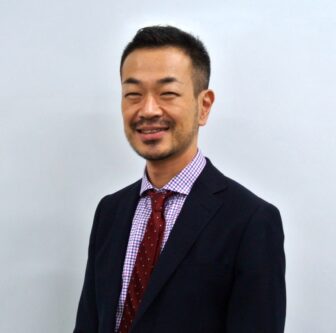 Yasuomi Sawa is executive director and co-founder of J-Forum, Japan’s first platform dedicated to peer training and solidarity among journalists. Since founding the organization from scratch, he has led it to become a vibrant space where journalists from across the country gather, share skills, and build mutual support. The Forum also launched Japan’s first Investigative Journalism Award and runs a website empowering parenting journalists. Before joining Waseda University as a professor of journalism, Sawa spent 30 years at Kyodo News, Japan’s largest news agency. His investigative reporting includes work on the Panama Papers and other ICIJ projects, as well as exposing that the government had no record of whether around 10,000 foreign children were attending school, uncovering the courts’ silent disposal of major post-war constitutional case records, and revealing sexual exploitation of teenage girls in Tokyo. He has authored three books on journalism.
Yasuomi Sawa is executive director and co-founder of J-Forum, Japan’s first platform dedicated to peer training and solidarity among journalists. Since founding the organization from scratch, he has led it to become a vibrant space where journalists from across the country gather, share skills, and build mutual support. The Forum also launched Japan’s first Investigative Journalism Award and runs a website empowering parenting journalists. Before joining Waseda University as a professor of journalism, Sawa spent 30 years at Kyodo News, Japan’s largest news agency. His investigative reporting includes work on the Panama Papers and other ICIJ projects, as well as exposing that the government had no record of whether around 10,000 foreign children were attending school, uncovering the courts’ silent disposal of major post-war constitutional case records, and revealing sexual exploitation of teenage girls in Tokyo. He has authored three books on journalism.
As a candidate seeking election to GIJN’s Board, Sawa says:
Journalists must be independent, but never isolated. Only through solidarity and collaboration can we realise the full power of investigative journalism.
When I first attended a GIJN conference 11 years ago, I was deeply inspired by the spirit of collaboration I witnessed. At that time, Japan lacked organizations connecting journalists across newsrooms; reporters were often strangers and rivals.
Three years later, we launched the first J-Forum meeting — a modest gathering of about 100 people, serving biscuits and instant coffee — which has since grown into a vibrant annual event of over 700 participants. GIJN played a vital role in igniting that transformation, and I am eager to give back.
If elected to the Board, I would focus on three priorities:
- Connecting with the next generation: We must ensure that students and young people understand the value of investigative journalism, especially as media ecosystems fragment. Building youth outreach will be central to sustaining our mission.
- Solidarity within and from Asia: Journalists in many Asian countries face threats and suppression. GIJN can strengthen regional collaboration so we can support one another — and share Asian experiences and resilience with the wider global community.
- Protecting journalists: Threats, lawsuits, and online/offline harassment against journalists are spreading, even in democracies. I will work to make knowledge and tools for protecting investigative journalists more accessible, translate them into more languages, and strengthen relationships with other organizations protecting journalists.
Thank you for your consideration. I am eager to contribute my energy and experience to make GIJN even stronger, more inclusive, and more supportive for journalists worldwide.

